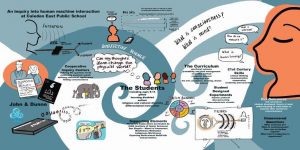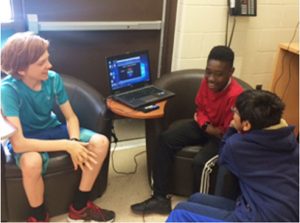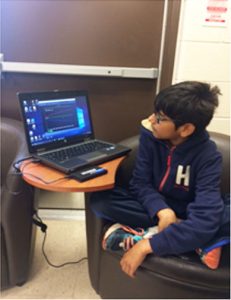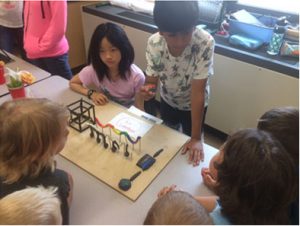
 In keeping with ICRL’s goal of advancing early education in consciousness studies, we have now entered into a collaboration with Jennifer Damianidis, a teacher in Caledon East Public School in Ontario, Canada. Ms. Damianidis has developed a Human-Machine Interaction Study that enables teachers to sustain a multi-dimensional inquiry that touches each of the modern learning competencies. The program uses contemplative practices, such as mindfulness and scientific inquiry in combination with random event generator technology to improve self-awareness.
In keeping with ICRL’s goal of advancing early education in consciousness studies, we have now entered into a collaboration with Jennifer Damianidis, a teacher in Caledon East Public School in Ontario, Canada. Ms. Damianidis has developed a Human-Machine Interaction Study that enables teachers to sustain a multi-dimensional inquiry that touches each of the modern learning competencies. The program uses contemplative practices, such as mindfulness and scientific inquiry in combination with random event generator technology to improve self-awareness.
 Junior and Intermediate students participate in a hands-on inquiry into quantum technology, use digital tools, and develop social-emotional awareness. Students also explore their own diverse cultural backgrounds, examine the implications of such technology on their worldview and evaluate the impact of results on current scientific paradigms.
Junior and Intermediate students participate in a hands-on inquiry into quantum technology, use digital tools, and develop social-emotional awareness. Students also explore their own diverse cultural backgrounds, examine the implications of such technology on their worldview and evaluate the impact of results on current scientific paradigms.
 It is designed for students who desire authentic learning experiences to discover new ideas and provide opportunities for innovation. It allows them to follow their passions and question the world around them while providing structure and guidance to ensure they are developing new inquiry skills and strategies for problem solving.
It is designed for students who desire authentic learning experiences to discover new ideas and provide opportunities for innovation. It allows them to follow their passions and question the world around them while providing structure and guidance to ensure they are developing new inquiry skills and strategies for problem solving.
This program is designed specifically for Junior and Intermediate enhanced learners and supports their unique strengths and challenges. It provides an authentic critical evaluation of new technology, a 21st-century competency everyone will need in the future. Students learn the various ways to go about this by looking at background science, studying the underlying math concepts and reading related literature. Most importantly they test the ideas experientially to validate the claims for themselves.
 The project links to the Ontario Science and Mathematics curriculum and includes STEAM (science, technology, engineering, art and math) applications that extend well beyond the curriculum: scientific innovation, computer programming, circuit design, human-machine interfaces, and artificial intelligence. It directly touches number sense, data management, probability and geometry, electronic and mechanical systems, as well as art. Visual arts, music, drama, and dance are used to help students process and assess complex ideas.
The project links to the Ontario Science and Mathematics curriculum and includes STEAM (science, technology, engineering, art and math) applications that extend well beyond the curriculum: scientific innovation, computer programming, circuit design, human-machine interfaces, and artificial intelligence. It directly touches number sense, data management, probability and geometry, electronic and mechanical systems, as well as art. Visual arts, music, drama, and dance are used to help students process and assess complex ideas.
Throughout the HMI Study the students also reflect on their identity, learning strengths and discovering areas of personal passion. The reflective portfolio format used in the study comes from the Ontario Ministry of Education‘s Creating Pathways to Success document. The students develop an online “All About Me” portfolio to help plan the next steps in their educational journey.
If you are interested in learning more about this project or participating in this experiential learning opportunity next year, please contact jennifer.damianidis@peelsb.com
or quantumlifeclass@gmail.com.
